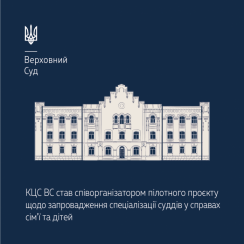Contact center of the Ukrainian Judiciary 044 207-35-46

Disputes affecting the interests of children are one of the most complex categories of cases considered by civil courts. This was said by Borys Hulko, President of the Civil Cassation Court of the Supreme Court, during a technical meeting on the implementation of a pilot project to introduce the specialisation of judges in family and children's affairs. The meeting was attended by representatives of the SC CivCC, the Inter-Agency Coordination Council on Juvenile Justice, the United Nations Children's Fund (UNICEF) in Ukraine, the NGO Volunteer, and judges from 12 courts selected for the pilot project.
Borys Hulko stressed the importance of the project and noted that it is being implemented in the context of the full-scale invasion of Ukraine by Russia, which is extremely difficult for the state in general and the judiciary in particular. The President of the SC CivCC thanked the presidents of the courts of appeal for the initiative to identify the courts where the pilot project will be implemented and the judges of these courts who responded to this proposal despite the fact that the judicial system is currently facing many problems, including a lack of staff.
Pavlo Parkhomenko, Judge of the Civil Cassation Court of the Supreme Court, said that the objectives of the pilot project are:
The expected outcomes of the project include Ukraine fulfilling its commitment to develop a child-friendly judiciary by appointing specialist judges for children and ensuring that these judges receive appropriate training; introducing the specialisation of judges in family and children's cases as a way of responding quickly to changes in social relations and the challenges of war; promoting close cooperation between specialists and the practical implementation of a multidisciplinary approach to ensuring the best interests of children; improving the efficiency of court proceedings in cases concerning families and children, and promptly making a lawful and fair decision with due regard for the best interests of the child. In addition, the project aims to multiply the best law enforcement practices, strengthen the unity of case law in family and children's cases, and create a modern, holistic system of specialisation for judges in family and children's cases based on the principles of mandatory and continuous professional training.
The initiative to pilot the introduction of specialisation of judges in family and children's cases is being implemented within the framework of the project ‘Providing psychosocial support and justice as part of better care for vulnerable children’, which is being implemented with the support of the United Nations Children's Fund (UNICEF) in Ukraine in cooperation with the Supreme Court and the Inter-Agency Coordination Council on Juvenile Justice.